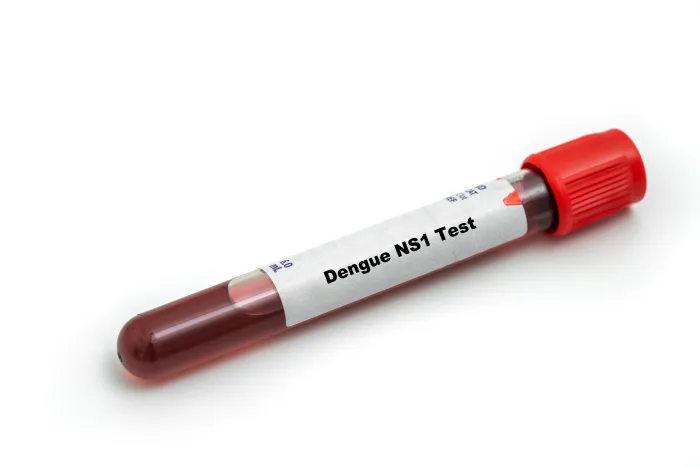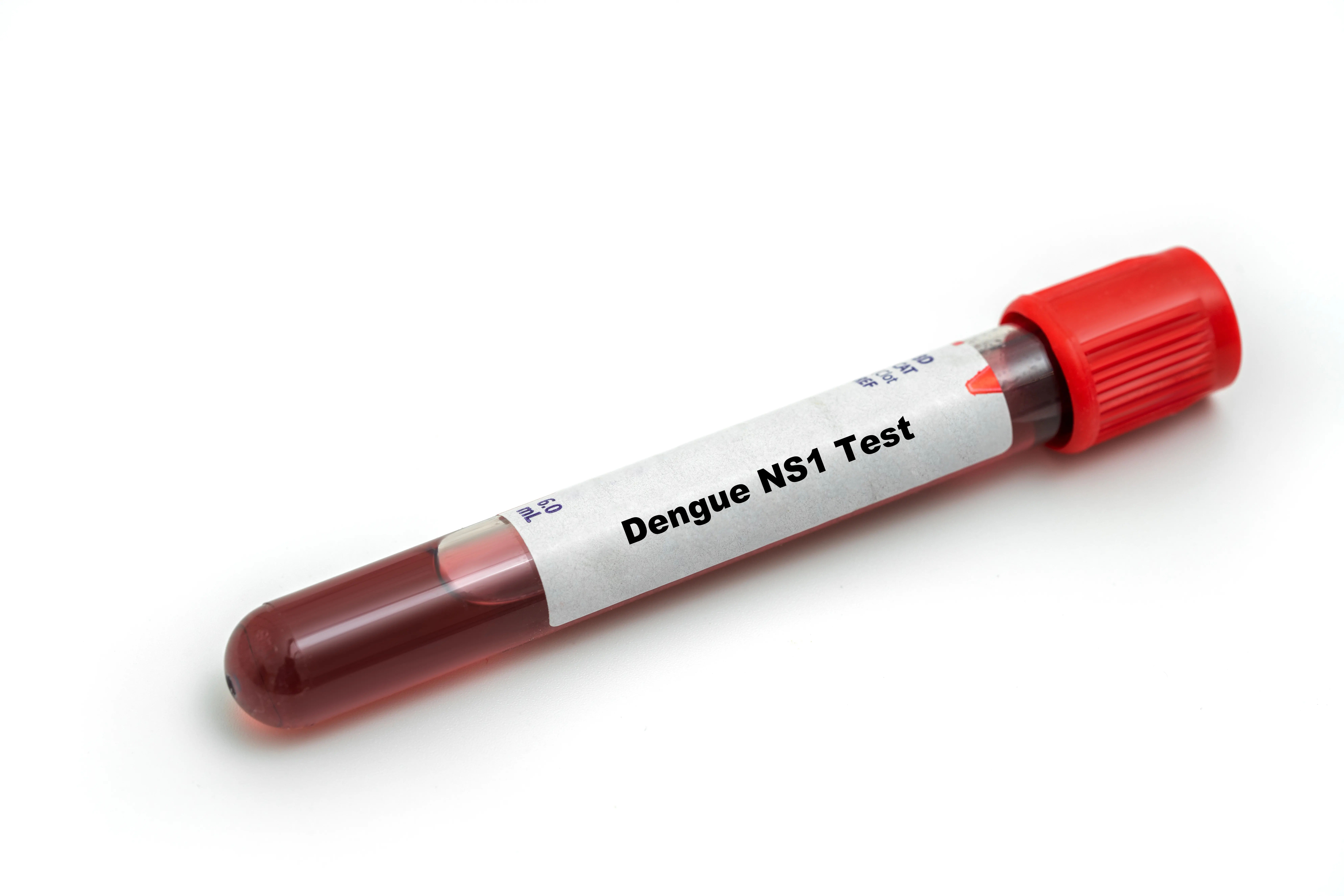Recurrent Fever in Men Over 50: Dengue NS1 Test and Other Checks
Recurrent fever in men over 50 needs investigation. Learn about the Dengue NS1 test and other crucial checks to diagnose the root cause, from viral infections to underlying conditions.

Written by Dr. Rohinipriyanka Pondugula
Reviewed by Dr. D Bhanu Prakash MBBS, AFIH, Advanced certificate in critical care medicine, Fellowship in critical care medicine
Last updated on 8th Aug, 2025

Monsoon season increases the risk of mosquito-borne infections, and dengue is among the most widespread and potentially dangerous. For men over 50, the chances of serious complications from dengue are higher. This is often due to an age-related decline in immunity and the presence of other health conditions such as diabetes, high blood pressure, or heart disease. A fever that might seem mild at first can quickly become severe if the illness isn’t recognised early.
This article explains why the Dengue NS1 test is a valuable tool for men in this age group, especially when dealing with a recurring or unexplained fever during the rainy season. We’ll explore how dengue affects older adults differently, why early testing is essential, and how timely diagnosis can lead to better outcomes and lower the risk of serious illness.
Why is Dengue Risk Higher for Men Over 50?
Dengue is a viral infection spread by the bite of an infected Aedes mosquito. These mosquitoes breed in stagnant water, which collects easily during the rainy season. After a bite, symptoms usually appear within 4 to 10 days.
Older adults, including men over 50, face a higher risk of serious illness from dengue during the monsoon months. This increased risk is due to several important factors:
- Weakened Immune System: As we age, our immune systems naturally become less robust. This means the body might not fight off the dengue virus as effectively as a younger person's, potentially leading to a more severe or prolonged illness.
- Co-existing Health Conditions: Many men over 50 live with other chronic health conditions like diabetes, heart disease, kidney problems, or high blood pressure. Dengue can worsen these existing conditions, and these conditions, in turn, can make dengue complications more severe.
- Delayed Symptom Recognition: Symptoms in older adults can sometimes be less typical or mistaken for other age-related ailments, leading to delays in seeking medical attention. A persistent fever check for elderly men should always prompt further investigation.
- Faster Progression to Severe Dengue: Due to a less resilient immune response and underlying health issues, dengue can progress more quickly and may lead to severe complications such as Dengue Haemorrhagic Fever (DHF) or Dengue Shock Syndrome (DSS), which involve internal bleeding, fluid loss, and dangerously low blood pressure.
- Dehydration Risk: Older individuals are often more prone to dehydration, which can be a serious complication in dengue as the virus can cause fluid leakage from blood vessels.
This is why early diagnosis is critical, especially for senior men.
The Importance of the Dengue NS1 Test
The Dengue NS1 Antigen Test is a key tool for diagnosing dengue early. NS1 stands for Non-Structural Protein 1, a protein released into the bloodstream during the initial phase of dengue infection.
- Early Detection: Unlike antibody tests (IgM/IgG), which become positive several days into the infection, the NS1 antigen can be detected in the blood from the first day of fever and up to 5-7 days after symptoms begin. This makes it invaluable for early diagnosis.
- Guiding Treatment: An early positive NS1 test allows doctors to confirm dengue quickly. This means they can start monitoring the patient closely for warning signs of severe dengue, such as a sudden drop in platelet count or signs of fluid leakage, and implement supportive care measures without delay.
- Preventing Complications: For men over 50, where complications can escalate rapidly, an early diagnosis from a dengue NS1 test for men 50 plus allows for timely management, potentially preventing the progression to severe and life-threatening forms of the disease. It also helps differentiate dengue from other common monsoon fevers.
When to Consider a Dengue NS1 Test for Men Over 50?
If a man over 50 develops a fever during the monsoon season, especially if it's persistent or accompanied by other symptoms, consulting a doctor and considering a Dengue NS1 test is highly recommended.
Key indicators for considering the test include:
- Sudden high fever (often above 102°F or 39°C)
- Severe muscle, joint, or bone pain
- Headache, especially behind the eyes
- Nausea or vomiting
- Loss of appetite
- Skin rash appearing a few days into the fever
- Weakness or dizziness
- Recent travel to dengue-prone areas
- Any unexplained or recurrent fever during the monsoon prompts a thorough dengue fever check for elderly men.
What to Expect from a Dengue NS1 Test?
A Dengue NS1 test for men 50 plus is a simple blood test. A healthcare professional will draw a small sample of blood, usually from a vein in the arm. The procedure is quick and typically causes only mild discomfort.
- No Fasting Required: You do not need to fast before a Dengue NS1 test, making it convenient.
- Timely Results: Results are often available within a few hours to a day, which is crucial for early management.
What the Results Mean:
- Positive NS1 Result: A positive result indicates an active dengue infection. This means the dengue virus is present in the body. Your doctor will then monitor your condition closely, especially for warning signs of severe dengue, and guide supportive care.
- Negative NS1 Result: A negative result means the NS1 antigen was not detected. If symptoms persist, your doctor might recommend repeating the test after a few days or performing other tests (like IgM/IgG antibodies) as the infection progresses, or investigating other causes for the fever.
It's important to remember that test results should always be interpreted by a doctor, who will consider your symptoms, medical history, and local dengue prevalence.
What to Do After a Positive Dengue NS1 Test?
Getting a positive Dengue NS1 result means the virus is active in your body. For older adults, especially senior women, quick action is key to staying safe and avoiding serious complications.
Here’s what usually happens next:
- Doctors will monitor your platelet count regularly to catch any sudden drops
- You’ll be advised to rest and drink plenty of fluids to stay hydrated and help your body recover
- Follow-up blood tests, like a CBC, will help track your health, including platelets and haemoglobin levels
- If your platelet count falls too low or you show warning signs like bleeding or severe weakness, hospital care may be needed
- The earlier you start treatment and monitoring, the better your chances of a smooth recovery. Dengue can be serious, but with prompt care, most people get better without complications.
Dengue NS1 Testing with Apollo 24|7
Apollo 24|7 offers an accurate and timely dengue NS1 test for men 50 plus, especially valuable during the early phase of infection when fast diagnosis can make a major difference. The Dengue NS1 test helps detect dengue infection within the first five days of symptom onset, even before antibodies are formed, allowing for earlier medical intervention and reduced risk of complications.
- Apollo 24|7 makes it simple and safe to get tested at the right time.:
- Easy online booking for the Dengue NS1 test through the website or app
- Home sample collection so senior women can get tested comfortably without visiting a clinic
- Fast and reliable results delivered digitally for quicker diagnosis
- NABL-accredited labs, ensuring trusted and high-quality testing
- Doctor consultations are available, so you can discuss the test results and get the right treatment guidance
Get Your Health Assessed Here
Conclusion
Dengue cases often spike during the monsoon, and older adults, including men over 50, are more likely to develop severe complications. That’s why early testing is so important. The Dengue NS1 test can detect the virus in its earliest stage, giving doctors a head start in managing symptoms and preventing severe illness.
If a man over 50 you care for develops a fever during this season, don’t wait. Recognising the signs and getting tested early can lead to faster treatment, better monitoring, and safer outcomes.

.webp)
